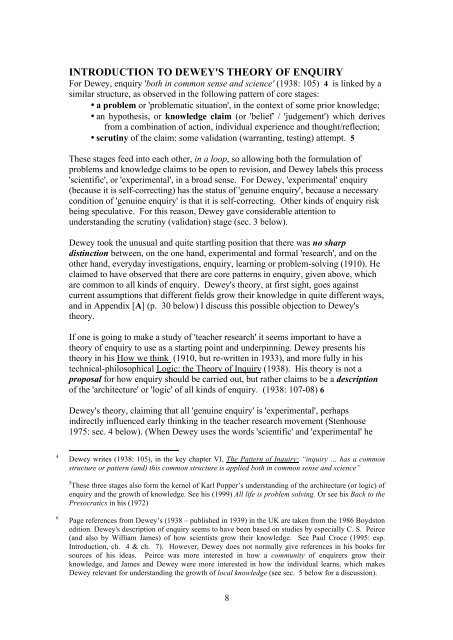RADICAL TEFL
2hqhXJd
2hqhXJd
You also want an ePaper? Increase the reach of your titles
YUMPU automatically turns print PDFs into web optimized ePapers that Google loves.
INTRODUCTION TO DEWEY'S THEORY OF ENQUIRY<br />
For Dewey, enquiry 'both in common sense and science' (1938: 105) 4 is linked by a<br />
similar structure, as observed in the following pattern of core stages:<br />
• a problem or 'problematic situation', in the context of some prior knowledge;<br />
• an hypothesis, or knowledge claim (or 'belief' / 'judgement') which derives<br />
from a combination of action, individual experience and thought/reflection;<br />
• scrutiny of the claim: some validation (warranting, testing) attempt. 5<br />
These stages feed into each other, in a loop, so allowing both the formulation of<br />
problems and knowledge claims to be open to revision, and Dewey labels this process<br />
'scientific', or 'experimental', in a broad sense. For Dewey, 'experimental' enquiry<br />
(because it is self-correcting) has the status of 'genuine enquiry', because a necessary<br />
condition of 'genuine enquiry' is that it is self-correcting. Other kinds of enquiry risk<br />
being speculative. For this reason, Dewey gave considerable attention to<br />
understanding the scrutiny (validation) stage (sec. 3 below).<br />
Dewey took the unusual and quite startling position that there was no sharp<br />
distinction between, on the one hand, experimental and formal 'research', and on the<br />
other hand, everyday investigations, enquiry, learning or problem-solving (1910). He<br />
claimed to have observed that there are core patterns in enquiry, given above, which<br />
are common to all kinds of enquiry. Dewey's theory, at first sight, goes against<br />
current assumptions that different fields grow their knowledge in quite different ways,<br />
and in Appendix [A] (p. 30 below) I discuss this possible objection to Dewey's<br />
theory.<br />
If one is going to make a study of 'teacher research' it seems important to have a<br />
theory of enquiry to use as a starting point and underpinning. Dewey presents his<br />
theory in his How we think (1910, but re-written in 1933), and more fully in his<br />
technical-philosophical Logic: the Theory of Inquiry (1938). His theory is not a<br />
proposal for how enquiry should be carried out, but rather claims to be a description<br />
of the 'architecture' or 'logic' of all kinds of enquiry. (1938: 107-08) 6<br />
Dewey's theory, claiming that all 'genuine enquiry' is 'experimental', perhaps<br />
indirectly influenced early thinking in the teacher research movement (Stenhouse<br />
1975: sec. 4 below). (When Dewey uses the words 'scientific' and 'experimental' he<br />
4<br />
Dewey writes (1938: 105), in the key chapter VI, The Pattern of Inquiry: “inquiry … has a common<br />
structure or pattern (and) this common structure is applied both in common sense and science”<br />
5 These three stages also form the kernel of Karl Popper’s understanding of the architecture (or logic) of<br />
enquiry and the growth of knowledge. See his (1999) All life is problem solving. Or see his Back to the<br />
Presocratics in his (1972)<br />
6<br />
Page references from Dewey’s (1938 – published in 1939) in the UK are taken from the 1986 Boydston<br />
edition. Dewey's description of enquiry seems to have been based on studies by especially C. S. Peirce<br />
(and also by William James) of how scientists grow their knowledge. See Paul Croce (1995: esp.<br />
Introduction, ch. 4 & ch. 7). However, Dewey does not normally give references in his books for<br />
sources of his ideas. Peirce was more interested in how a community of enquirers grow their<br />
knowledge, and James and Dewey were more interested in how the individual learns, which makes<br />
Dewey relevant for understanding the growth of local knowledge (see sec. 5 below for a discussion).<br />
8


